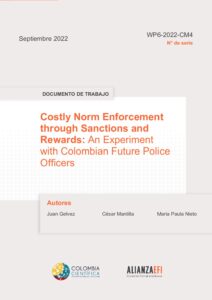The increasing lack of trust in the police around the globe reduces their indirect benefits, related to citizens’ feelings of safety and beliefs that the police are “doing something” to fight crime. We explore whether this generalized lack of trust among citizens correlates with their beliefs’ accuracy regarding fairness norm enforcement in a lab-in-the-field experiment conducted with future police officers. Two hundred nine police students played a dictator-like game with costly third-party reallocation. Participants acting as a third party could use onefourth of their endowment to either decrease (i.e., sanction) or increase (i.e., reward) the highest payoff among the two other players, the initial allocator and the transfer’s recipient.
We randomized whether a police student or a civilian was the recipient. Police students transfer roughly 40% of their endowment, regardless of the recipient’s identity. They are likely to incur costly reallocations between 55 and 75 percent of the time, especially when initial allocations are more inegalitarian and the recipient is also a police student. Moreover, when police students interact only with in-group members, they are more likely to reward, whereas they are more likely to sanction if the transfer’s recipient is a civilian. The subsequent prediction survey, conducted with over 200 civilians, reveals that respondents expected some in-group favoritism in the transfer and in the likelihood to reward. Although the probability of sanctioning was high, respondents overestimated the likelihood that police students engage in costly sanctions. Incentives and reporting a higher trust in the police are correlated with higher predictive accuracy.
Autores:
- César Mantilla
- Juan Gelvez-Ferreira
- María Paula Nieto
Palabras clave:
- Dictator Games
- Prediction Survey
- Public Servants
- Third-Party Reallocation
Categorías:
- Proyecto 6
- Documentos de trabajo
